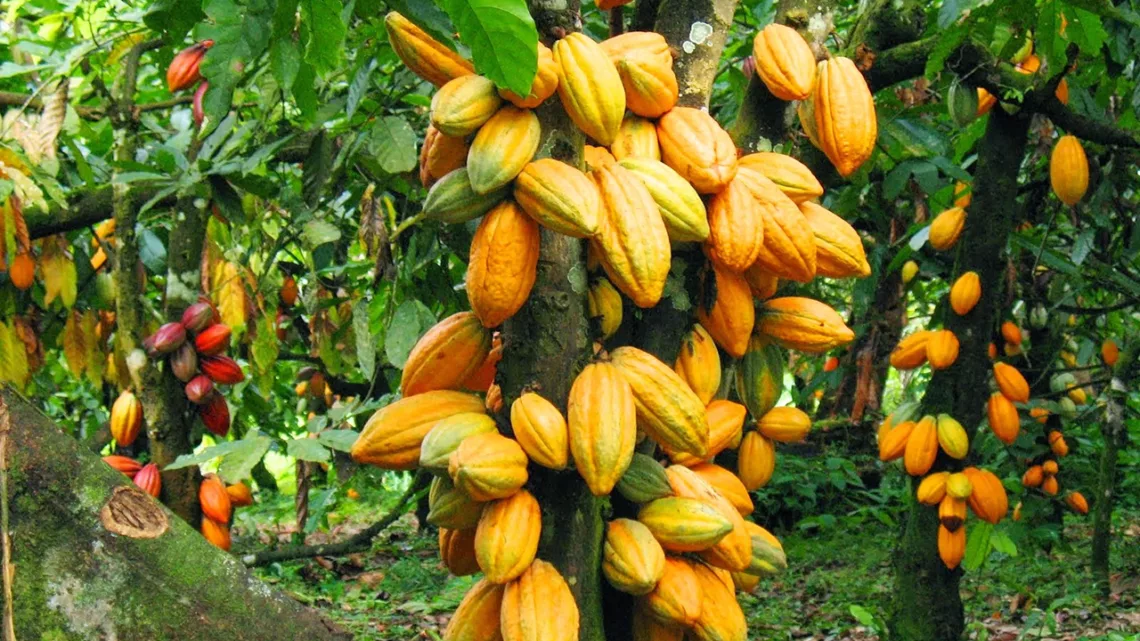In the mid-20th century, Nigeria was the world’s second-largest cocoa producer, contributing significantly to the foreign exchange earnings with about 490,000 metric tonnes.
But changing economic dynamics, lack of modernisation and various challenges have led to a decline in cocoa production and at wake of the 21st century, already the country had fallen behind other cocoa-producing nations, facing issues such as aging trees, low productivity and inconsistent quality.
With renewed recognition of the potential of cocoa to contribute to economic growth, employment generation, and poverty alleviation, Nigeria’s policymakers and stakeholders are now focusing on building a sustainable cocoa industry that is environmentally friendly, socially equitable and economically viable.
This renewed focus hold significant promises to the sector as Nigeria is now fourth in cocoa production behind Ivory Coast, Ghana and Indonesia with 340,000 metric tonnes and currently targeting 500,000 metric tonnes by the year 2024.
The new move requires adoption of innovative practices and by ensuring fair trade, Nigeria can position itself at the forefront of sustainable cocoa production, setting an example for other nations to follow and restore its lost glory.
Already stakeholders at the Nigeria Cocoa Summit had fashioned out certain modalities that highlighted the issues in the industry and proffered solutions to move the industry forward.
“It is interesting to note that stakeholders have taken numerous actions that are presently addressing some of the challenges militating against the sustainability of the sector like child labor menace, deforestation, traceability, application of unapproved or ban pesticide in cocoa farms etc,” national president, Cocoa Farmers Association of Nigeria (CFAN), Adeola Adegoke said.
He said the EU must begin to see Nigeria as a cocoa origin country that’s taking the bull by the horn to address the challenges of cocoa sustainability.
According to him, CFAN has distributed free GAP books to cocoa farmers across the cocoa producing states and cocoa communities in Nigeria, with support from the Cocoa Research Institute of Nigeria (CRIN), Harvestfield Industries Limited and other value chain stakeholders.
The GAP book addressed the gaps in the value chain and proffered the current standard method of producing sustainable cocoa beans along the supply chain.
The leader of cocoa farmers also disclosed that CFAN has carried out intervention to support Nigeria drives towards a sustainable cocoa supply chain in the regular trainings of our cocoa farmers on safe use of pesticides in cocoa farms in Ondo, Oyo, Ogun, Edo, Kwara, Ekiti, Cross River, Abia and Osun States.
He said, “CFAN has also partnered with CRIN to address the pre- harvest and post- harvest practices that affect cocoa quality through the regular trainings of our cocoa farmers on good cocoa flavor production that covers pod breaking, fermentation, sun drying and, bagging of cocoa beans across the cocoa producing states.
“The distribution of resilient variety like TC 1-9 18 months maturity circle has been consistently made available to our smallholder farmers across the cocoa producing states with the support of the Federal Ministry of Agriculture and Rural Development in the last two years”.
The new waves of promising efforts to reposition the sector towards its viability is welcome even as Nigeria struggles to feed its expanding population and create jobs through the revival of agriculture.
According to Adegoke, the collaboration between TRACE Lutheran World Relief and CFAN centered on the need to strengthen the traceability of the cocoa beans produced by the smallholder cocoa farmers and develop their capacity in order to establish transparency in the supply chain and enhance productivity per hectare will definitely transform the sector in the next five years.
He pointed out that the project targeted smallholder cocoa farmers that will also be trained on GAPS are in the six states of Ondo, Oyo, Ekiti, Cross River, Osun and Akwa Ibom.
“CFAN has taken it as matter of necessity the implementation of cocoa agro forestry practices amongst her members in order to solve the challenges of deforestation and protects our biodiversity. This program involves the preservation of our indigenous trees in our cocoa farms and the distribution of free tree seedlings to our cocoa farmers for planting on their cocoa farms.
The program will further reduce the carbon dioxide emission and place Nigeria to be listed to receive carbon credit funding very soon through REDD+, we are rest assured that Nigeria cocoa industry will soon witness a lot of transformation across the supply chain with the determination of all stakeholders to protect our huge investments and guarantee a seamless journey to full sustainability before 2025”, he added.
Overall, Nigeria has the potential to build a sustainable cocoa industry that not only contributes to economic growth but also safeguards the environment and improves the livelihoods of smallholder farmers. Through initiatives that focus on preserving biodiversity, empowering farmers, implementing certification standards, investing in research and development, and strengthening market linkages, Nigeria can emerge as a global leader in sustainable cocoa production.





